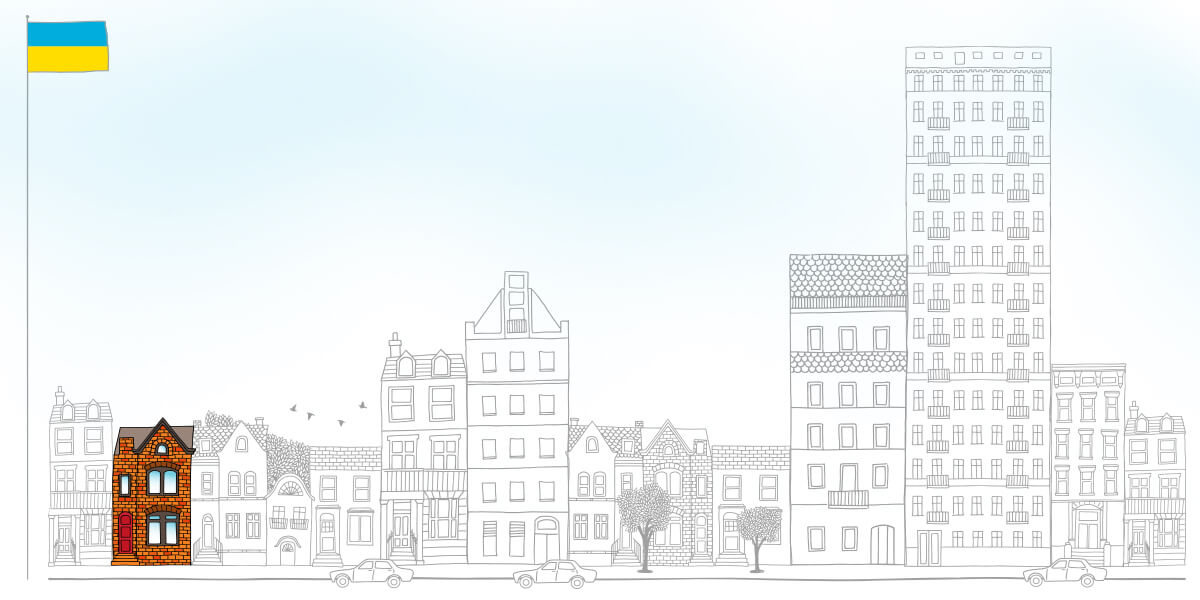
War from Afar
Every morning this spring, when Nikolai Kryvoruchko woke up, he checked in on his grandmother, Olga, in Ukraine. From his cellphone, the UM civil engineering student would tap into the security camera attached to a lamp post on her street in Zaporizhzhia. An unchanged view of her orange brick house, with its friendly red door, provided comfort for the 25-year-old in Winnipeg.
His grandma insisted on staying in her beloved hometown, where she works at a shoe factory producing boots for Ukraine’s military. When the sirens blare, she heads to the basement.
“If the picture is on the camera, the house is still there,” says Kryvoruchko. “My grandma can hear the bombings. It’s like 10 or 15 kilometres away.”
His parents were out of the country when Russia attacked in February. His mom, Julia, is safe with his sister, Anna, in Sweden while Kryvoruchko used savings earmarked for tuition to pay lawyer and travel fees to bring his father, Vadim, who is unfit to be a soldier, to Canada. He arrived with a backpack of belongings.
Donors stepped forward earlier this year with gifts to UM’s emergency bursaries fund, of which Kryvoruchko is a beneficiary. He compares the shock of being bombed by neighbouring Russia to the disbelief felt if the United States were to launch an air strike against Canada. “No one expected it,” he says.
When the conflict began, his mother had been caring for her elderly mom in Russia. Kryvoruchko feared she’d be discovered on enemy ground when the Russian military began checking people’s cellphones for evidence of anti-war sentiment. He says they were also forcing some Ukrainian men to fight for their side.
Kryvoruchko says war in his country has opened his eyes to the vulnerability felt by his UM classmate, whose family members are living in a refugee camp after fleeing Syria.
With plans to specialize in project management in the construction industry, Kryvoruchko says his career goal will allow him to better support his parents, and give back to other students going through a crisis where their education is in jeopardy. “Maybe one day my money will help another student to finish university. Pay it forward—that’s my motivation,” he says.
Yelyzaveta Proskurenko, a third-year political studies student who came to UM from Ukraine in 2019, also benefitted from the emergency bursaries fund, designated for students impacted by extenuating circumstances. When war broke out in her home city of Kyiv, her parents Roman and Oksana, and little sister Katya, fled to western Ukraine. During the upheaval, her father suffered a stress-induced heart attack. A news crew interviewed the 40-year-old in hospital during his recovery; Proskurenko watched from afar.
“It’s very stressful because I don’t know when I’m going to see my parents and you don’t have a place to go back to,” she says.
Her parents have since made the two-day trek to Poland. Worrying about loved ones took a toll on Proskurenko’s studies and mental health as she scrambled to try to connect friends in Ukraine and Poland to arrange safe lodgings. With her parents not able to send funds, Proskurenko received help to pay for daily expenses and her continued coursework.
In class, they’d discuss the conflict and its legalities. She chose political studies because of its creativity to problem-solve globally but hadn’t anticipated gaining such a personal perspective.
Bombing blew out the windows of her family’s 14th-floor suite in the capital’s town centre—the neighbourhood where she grew up. From the balcony, she could see the park that doubled as her backyard, where they’d spend hours beneath its sweeping canopy of trees.
“I knew war is bad but never saw it with my own eyes, so I didn’t feel it,” she says.
In May, UM announced a commitment of up to $1.7 million to support students in Ukraine—both undergraduate and graduate—as well as researchers wanting to come to our campuses to continue their disrupted work and studies.
The student funding takes many forms, including waived application fees, research experience internships, and awards covering tuition and accommodation. For researchers, there are up to 20 one-year stipends. The university also joined the Scholars at Risk Network, an international initiative that protects academics suffering threats to their lives, liberty and well-being by arranging temporary research and teaching positions at partnering institutions.
“It is paramount that such work is not thwarted and that those scholars who do this work can continue without fear for their personal safety,” says Digvir Jayas, vice-president (research and international) at UM.
Going forward, protocols established as a result of the war in Ukraine will guide how UM responds when future geopolitical conflicts arise elsewhere.
To assist UM students navigating unforeseen challenges, visit give.umanitoba.ca/emergency-bursaries






